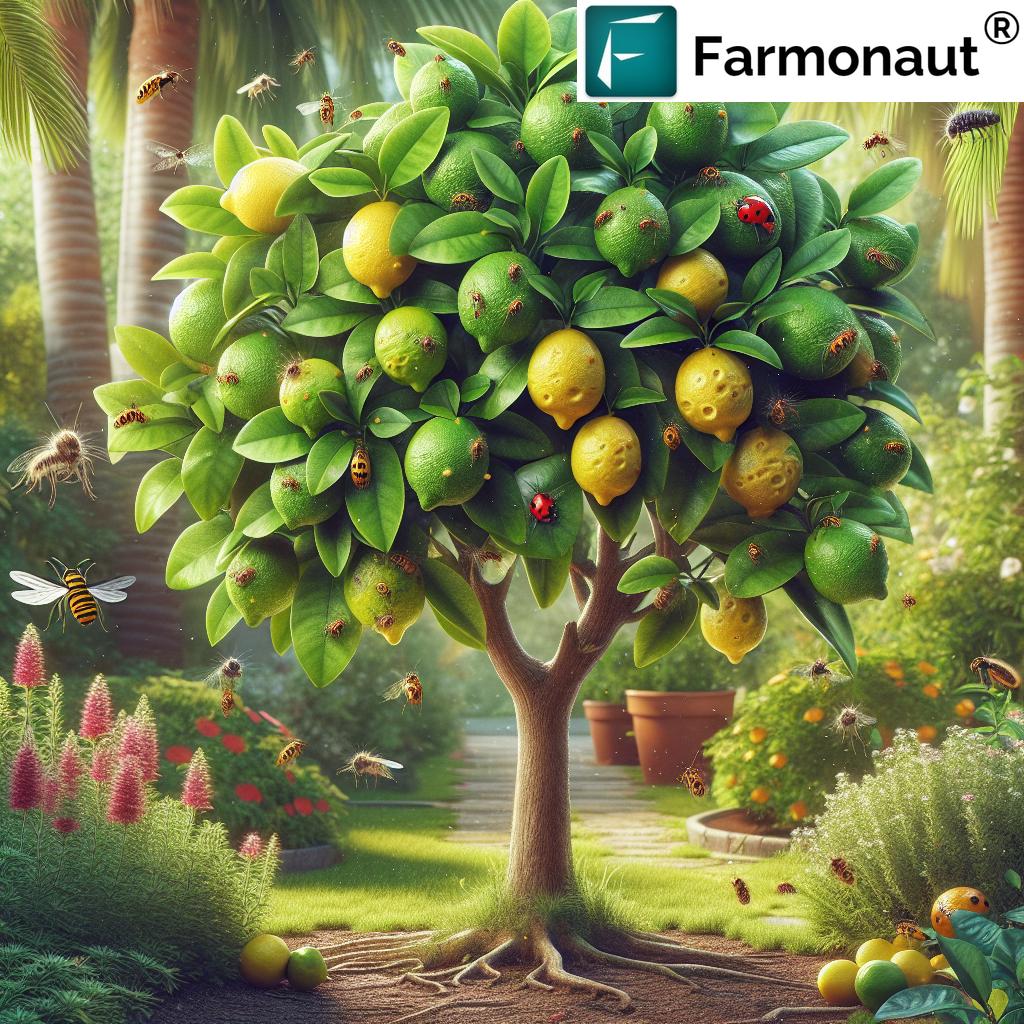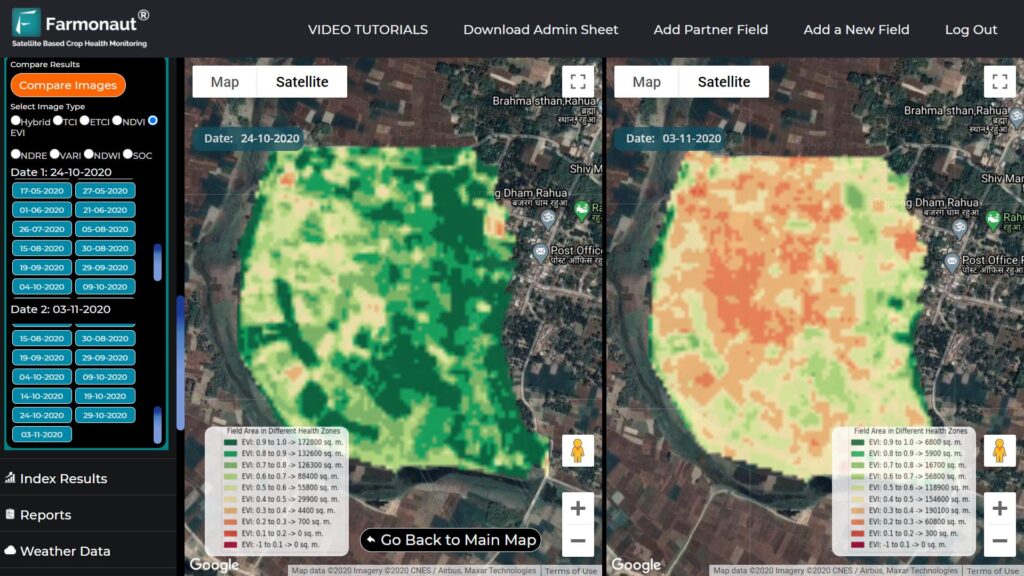Small Black Bugs on Lemon Tree: 7 Powerful Pest Solutions
Lemon trees (Citrus limon), cherished around the world for their bright yellow fruits and aromatic foliage, hold pride of place in home gardens and commercial orchards alike. However, even the healthiest trees can become susceptible to a range of lemon tree pests, particularly various small black insects on lemon tree and associated pests like aphids, scale, and citrus gall wasp. These pests threaten not only the health and productivity of the tree, but also its overall vitality and fruit yield.
Promptly identifying these insects and implementing effective lemon tree pest management strategies is absolutely crucial for ensuring the long-term health and growth of your lemon trees. In this comprehensive guide, we’ll detail exactly how to detect, control, and prevent common pests—sooty scale, aphids, citrus gall wasps, and more. Our aim is to empower you with practical tips and resources for preventing leaf drop in lemon trees and establishing natural remedies for lemon tree pests.
Table of Contents
- Early Signs of Pest Infestation on Lemon Trees
- Common Small Black Insects on Lemon Trees
- Visual Identification of Lemon Tree Pests
- Comparison Table: Lemon Tree Black Bugs
- 7 Powerful Pest Solutions for Lemon Tree Pest Management
- Advanced Diagnostics: Using Farmonaut for Optimal Lemon Tree Health
- Proactive Prevention: Stopping Lemon Tree Pest Infestations Before They Start
- FAQs: Your Lemon Tree Pest Questions Answered
- Conclusion: Ensuring Robust Lemon Tree Growth & Productivity
Early Signs of Pest Infestation on Lemon Trees
Lemon tree pests, particularly small black insects on lemon tree, often go unnoticed until substantial damage is already done. Detecting signs of pest infestation on lemon trees at the earliest stage can mean the difference between a robust harvest or widespread leaf drop and reduced productivity.
- Sooty Mold on Lemon Leaves: Dark, powdery, or sticky mold appears on leaves and branches. This mold develops from the honeydew secreted by sap-sucking insects like aphids on citrus trees and scales. The black fungus can coat entire surfaces, obstructing sunlight and hindering photosynthesis.
- Distorted, Yellowing, or Stunted Leaves: Infested leaves often curl, yellow, or display stunted growth. This sign, especially when combined with sticky honeydew residue, is a direct indicator of aphid or scale activity.
- Premature Leaf Drop: Severe infestations lead to premature drop of leaves and weakened tree vigor.
- Presence of Visible Insects: Observe carefully for small black insects clustering on the undersides of leaves, along stems, or on young shoots. High populations signal a severe infestation.
- Sticky Substances on Leaves: If you feel a sticky substance when touching the leaves or branches, it is likely honeydew—which also attracts ants and allows sooty mold to thrive.
- Visible Galls or Swellings: Outgrowths or abnormal swellings (galls), especially on twigs and branches, are indicative of citrus gall wasp infestations.
Being familiar with these common indicators is vital for early intervention.
Tip: Examine not just the upper leaf surfaces but the undersides of leaves—many insects hide there.
Common Small Black Insects on Lemon Tree: Identification & Behavior
Understanding which pests are most likely to attack your lemon tree helps you choose the right management strategy. Here are the most common small black insects found on lemon trees and their unique impact on tree health and fruit production:
1. Black Scale (Saissetia oleae)
- Appearance: Oval, shiny, dome-shaped insects—black or dark brown—attach in clusters on leaves, stems, or branches.
- Feeding: Use piercing mouthparts for extracting sap from plant tissues.
- Key Damage: Reduced vigor, yellowing and drop of leaves, lots of sticky honeydew—promotes sooty mold.
- Severity: Capable of causing widespread loss of productivity when not controlled.
Read more about black scale in lemon trees.
2. Aphids (Aphidoidea): Aphids on Citrus Trees
- Appearance: Tiny, soft-bodied black (or green/yellow) insects found in colonies on growing tips, leaf undersides, and young shoots.
- Feeding: Suck plant sap, causing distorted growth, curling, and yellowing.
- Honeydew Production: Leaves sticky secretions attracting ants and supporting sooty mold on lemon leaves.
- Aggressiveness: Known for rapid reproduction, so infestations can quickly escalate.
More details at aphids on citrus trees.
3. Citrus Gall Wasp (Bruchophagus fellis): Galls & Dieback
- Appearance: Tiny black wasps laying eggs under bark of twigs and young branches.
- Galling: Formation of visible galls—swollen, knobby outgrowths.
- Damage: Galls restrict sap flow, causing branch dieback and reduced tree vigor.
Health management info: citrus gall wasp control
Other Notable Black Bugs: Citrus Leaf Miners, Thrips, and Mites
- Citrus leaf miners: Larvae tunnel within leaves, leaving silvery trails and weakening lemon tree health.
- Thrips: Minute, slender bugs causing blemishes and deformed fruit.
- Mites: Not always black but may be dark in color; cause leaf stippling and drop.
Visual Identification: Spotting Lemon Tree Pests on Leaves, Branches, and Stems
Many lemon tree pest infestations begin unobtrusively—tiny black insects hiding on the undersides of leaves, along branches, or in leaf axils where two leaves meet the stem. Use these strategies to visually confirm signs of pest infestation on lemon trees:
- Inspect for clusters of dark, dome-shaped bumps—scale insects attach and are often mistaken for plant tissue.
- Look for shiny, sticky residue (honeydew) on leaves or dripping onto surfaces below the tree.
- Notice black powdery coatings (sooty mold), or yellow, distorted new growth.
- Prune open a gall on a branch to check for wasp larvae.
- Disturbed leaves or unusual patterns on young growth are often the first visible symptom, even before direct sighting of insects.
Comparison Table: Common Black Bugs on Lemon Trees & Management Solutions
| Pest Name | Appearance | Common Symptoms | Estimated Infestation Severity | Impact on Lemon Tree | Recommended Control Methods | Estimated Effectiveness Rate (%) |
|---|---|---|---|---|---|---|
| Black Scale (Saissetia oleae) | Black, dome-shaped, immobile bumps on leaves, stems, and branches | Sticky honeydew, sooty mold, yellowing leaves, premature leaf drop | High | Weakens tree, reduces vigor and fruit yield, leaf drop | Prune infested branches, apply horticultural oils, introduce natural predators (ladybugs, wasps), insecticidal soap for severe infestations | 80-90% |
| Aphids (Aphidoidea) | Very small (<2mm), soft-bodied black (or green), clusters on growing tips and leaf undersides | Curling, yellowing, stunted leaves; sticky honeydew; attracts ants and sooty mold | Medium-High | Stunted/deformed growth, reduced fruiting, leaf drop | Natural predators (ladybugs, lacewings), neem oil, insecticidal soap | 75-85% |
| Citrus Gall Wasp (Bruchophagus fellis) | Tiny black wasps; visible galls on twigs/branches | Knobbly swellings (galls), branch dieback, reduced vigor | Medium | Restricts sap flow, weakens branches, leads to dieback | Prune and destroy affected twigs before wasps emerge; dispose of galls in sealed bags | 70-80% |
| Citrus Leaf Miner (larvae) | Tiny dark/grayish larvae inside leaves; silvery lines/trails | Winding silvery trails, distorted/curling young leaves | Low-Medium | Weakens growth, increases susceptibility to other pests | Remove infested leaves, apply horticultural oil, pheromone traps | 60-75% |
| Thrips | Slender black/brown insects; often on flowers/new fruit | Fruit scarring, silvering or browning on petals, uneven skin texture | Low | Reduced fruit quality/marketability | Blue/yellow sticky traps, natural predators | 55-70% |
| Mites | Tiny, sometimes dark, visible with hand lens; stippling on leaves | Yellowing or stippled leaves, potential leaf drop in severe cases | Low | Reduces photosynthesis, general weakening | Miticides (as last resort), encourage predatory mites | 60-70% |
Want to automate pest detection and improve crop health remotely? Our large-scale farm management system lets you monitor vegetation health (NDVI), detect disease and pest infestations, and optimize resource use for lemon and citrus orchards.
Need to track the carbon impact of your lemon plantation? See Farmonaut’s carbon footprint tracking for sustainable orchard management.
Want to verify your produce’s origin and ensure transparent supply chain records? Explore our blockchain-based product traceability—ideal for lemon growers seeking higher market value and consumer trust.
7 Powerful Pest Solutions for Effective Lemon Tree Pest Management
Integrated pest control—using a tailored mix of cultural practices, biological controls, and chemical treatments—provides the most effective defense for lemon tree pest management. Here’s how to decisively reduce populations and restore tree health:
-
Regular Inspection & Early Intervention (Cultural Practice)
- Periodically inspect leaves (especially undersides), branches, and stems for any signs of pest infestation on lemon trees.
- Promptly identify: sticky substances, mold, black spots, new galls, or visible black insects.
- Early detection = easier, lower-impact management.
-
Strategic Pruning & Physical Removal (Reduce Infested Material)
- Prune off heavily infested branches or twigs (especially for scale insects or galls).
- For citrus gall wasp control, prune galled stems before wasps emerge (late winter).
- Dispose of pruned material in sealed bags; don’t compost.
-
Support Tree Vigor: Proper Watering & Fertilization
- Maintain optimal watering and regular fertilization to ensure tree health.
- Stressed trees are more susceptible to insect infestations and mold problems.
-
Encourage Natural Predators (Biological Control)
- Foster a healthy garden ecosystem: ladybugs, lacewings, and parasitic wasps feed on aphids and scale insects.
- Let beneficial insects do the work of reducing pest populations naturally.
-
Natural Remedies: Neem Oil & Horticultural Oils
- Neem oil: Disrupts insect feeding and development, safe for beneficial insects when used as directed.
- Horticultural oils: Coat and suffocate soft-bodied pests like scales and aphids; can also suppress sooty mold.
- Apply oils during dormant periods or cool times to avoid leaf burn.
- See how to get rid of scale insects on citrus for detailed directions.
-
Insecticidal Soap Applications (Chemical Control – Low Impact)
- Insecticidal soaps are effective against soft-bodied insects like aphids and scales.
- Good for quick knockdown with minimal risk to humans, pets, and beneficial insects—always follow label instructions.
-
Systemic Insecticides (Chemical Control – Last Resort)
- Systemic insecticides move through plant tissues and can control pests hidden inside leaves or stems.
- Recommended only for severe, unmanageable infestations due to potential impact on pollinators and beneficial organisms.
- Always follow regional regulations and safety guidelines.
For an eco-friendly, holistic approach, focus on cultural practices and biological controls as your first defense, reserving chemical controls for situations where pest populations could otherwise cause significant damage to your tree’s health and productivity.
Interested in integrating remote monitoring into your pest management? With Farmonaut, we empower agribusinesses and individual farmers to monitor crop health from the sky using satellite data. This means timely detection of unusual patterns such as abnormal leaf color or canopy density—often early indicators of pest and disease outbreaks.
Integrate remote field insights for lemon orchards
in your systems
Farmonaut Satellite Weather API Docs
Advanced Diagnostics: Using Farmonaut for Optimal Lemon Tree Health
Cutting-edge farm management technology can transform how we combat lemon tree pests and insect infestations—especially on larger farms or plantations. Our Farmonaut platform is uniquely designed to help monitor and optimize tree health using the latest remote-sensing data.
- Satellite Imagery for Crop Health Monitoring: Detect large-scale pest stress, reduced growth, or leaf drop across your lemon or citrus blocks—even before symptoms are visible from the ground.
- AI-Based Advisory System: Personalized, actionable advice for irrigation, fertilization, and pest management—all powered by AI analysis of ongoing crop health and weather trends.
- Blockchain Traceability: Ensure full transparency for your lemons and citrus fruits—essential for organic or export markets.
- Resource Management: Track field tasks, fleet, and input use to target infestation hotspots and reduce unnecessary pesticide application.
- Carbon Footprinting: Our system helps you monitor and reduce your orchard’s environmental impact, supporting sustainability goals.
Learn about our subscription options for individuals & agribusinesses below, or try the Farmonaut App for real-time crop monitoring.
Proactive Prevention: Stopping Lemon Tree Pest Infestations Before They Start
Preventing leaf drop in lemon trees and minimizing future infestations is best achieved by keeping your trees healthy and less attractive to pests. Here are the most effective preventive strategies:
-
Maintain Overall Tree Health:
- Healthy, vigorously growing lemon trees are the least susceptible to pests.
- Practice regular watering, soil health enhancement, and balanced nutrient application.
-
Remove Debris and Fallen Fruit:
- Regularly remove any fallen leaves, fruit, or pruning debris from under trees—these can harbor returning pest populations.
-
Manage Ants:
- Ants protect aphids and scales for their honeydew—use sticky bands on trunks or targeted ant controls (read more).
-
Improve Air Circulation and Light Penetration:
- Prune for open canopies; sooty mold struggles to establish where sunlight is plentiful and airflow is high.
-
Encourage Beneficial Insects:
- Plant companion flowers nearby to attract ladybugs, wasps, and lacewings, ensuring ongoing natural biological control.
-
Regular Inspection as a Habit:
- Build a routine of cultural practices—walking your citrus block every 2-3 weeks during the growing season.
-
Rotate Chemicals:
- If you use pesticides or oils, rotate their type each season to avoid resistance build-up in pest populations.
Bonus: For comprehensive advice and updates on pest risk for your region, leverage Farmonaut’s AI-based advisory platform—empowering you with relevant, timely, and data-driven solutions for fruit and citrus growers.
For Forestry & Plantation Projects: Manage large-scale citrus and lemon plantations, monitor tree populations, and predict pest outbreaks with our dedicated crop, plantation, and forest management tools.
FAQs: Your Lemon Tree Pest Questions Answered
Conclusion: Ensuring Robust Lemon Tree Growth & Productivity
Lemon trees are beautiful and bountiful additions to any orchard or backyard. Yet, their health and fruitfulness can be compromised by small black insects on lemon tree such as aphids, scale, gall wasps, and related pests.
The key to thriving trees? Early identification of pest issues, integrated management, and proactive prevention. By adopting a blend of cultural practices, biological controls, and careful use of chemical treatments, you can ensure robust growth, consistent fruit production, and tree vitality for many seasons to come.
To further enhance your orchard’s resilience, integrate Farmonaut’s real-time monitoring and AI-driven diagnosis. From early alerts to carbon tracking and supply chain traceability, our technology-driven platform puts the power of precision agriculture into your hands.
For affordable, scalable, and cutting-edge pest management—
put Farmonaut’s precision agriculture platform to work for your lemon trees today.


















